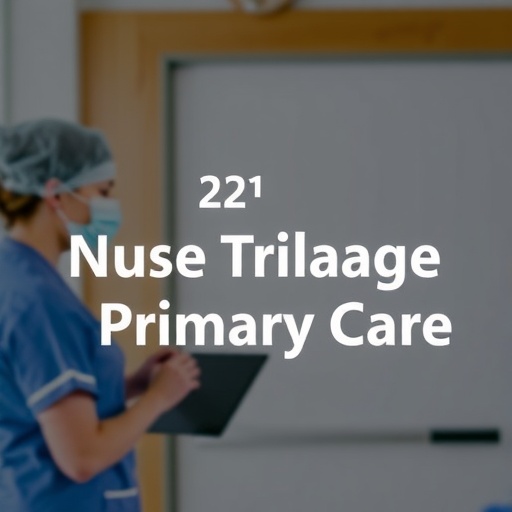In a world where healthcare systems are increasingly under strain, the concept of nurse triage in primary care is emerging as a critical area of exploration. A recent study by Park, Lee, and Wallace published in BMC Nursing delves deeply into this innovative approach, presenting a comprehensive analysis of its significance and implementation. The need for efficient triage processes is more critical than ever, especially in light of the growing demand for healthcare services fueled by aging populations and chronic illness prevalence.
Nurse triage refers to the process by which nurses assess patients’ conditions and determine the appropriate level of care required. Traditionally, this function has been confined to emergency care settings. However, the authors of the study assert that integrating nurse triage into primary care can streamline patient flow, reduce unnecessary emergency visits, and enhance overall patient outcomes. This shift reflects a changing paradigm in healthcare where nurses take an increasingly pivotal role in patient management and decision-making.
The paper outlines the framework surrounding nurse triage, emphasizing its multifaceted nature. By analyzing the existing literature, the study identifies key components of an effective triage system, including clinical judgment, communication skills, and an understanding of patient needs. Explicitly, the authors illustrate how these competencies enable nurses to prioritize care effectively and respond to the diverse demands presented by patients in a primary care setting.
An essential aspect explored in the study is the variability in nurse triage practices across different healthcare contexts. The authors point out that while some clinics may adopt a structured approach with well-defined protocols, others may lack formal guidelines, leading to inconsistencies in patient care. This discrepancy can impact not only patient satisfaction but also the overall efficiency of healthcare delivery. The research advocates for standardized guidelines to unify triage practices, ensuring that patients receive appropriate care in a timely manner.
Moreover, the study highlights the importance of integrating technology into the triage process. In an era where digital health is on the rise, the authors call for the development of electronic triage tools that assist nurses in making informed decisions. Such systems can offer rapid access to patient histories, decision support algorithms, and real-time data analytics, ultimately promoting a more systematic approach to triage and fostering a culture of evidence-based practice.
Another intriguing dimension of nurse triage is its potential socio-economic impact. The study argues that effective triage can significantly reduce healthcare costs by preventing unnecessary hospital admissions and addressing issues at the primary care level. With the rising burden of healthcare expenditure, this financial aspect presents a compelling argument for the broader adoption of nurse triage. By enhancing efficiency, healthcare systems can allocate resources to other pressing areas of need, ultimately improving overall population health.
However, the integration of nurse triage into primary care is not without its challenges. The authors acknowledge that implementing this innovative approach necessitates substantial organizational support and training. Healthcare institutions must invest in educational programs that equip nurses with the necessary skills and knowledge to perform triage effectively. Furthermore, fostering an interdisciplinary team-driven environment is crucial for ensuring that nurses are empowered to make triage decisions collaboratively.
The study also addresses potential barriers to successful triage in primary care, such as staff shortages and high patient volumes. The authors stress that without adequate staffing levels, even the most well-designed triage system may falter under pressure. This highlights the urgent need for policy changes that support nurse recruitment and retention, thereby ensuring that primary care facilities can maintain efficient and effective triage systems.
Park, Lee, and Wallace conclude their analysis by emphasizing the distinctive role that nurse triage can play in transforming primary care. They advocate for further research into the outcomes associated with nurse-led triage initiatives, suggesting that longitudinal studies may reveal deeper insights into its effectiveness and impact on patient care. Additionally, they highlight the importance of ongoing dialogue among healthcare professionals regarding the evolving role of nurses in triage, encouraging a culture of continuous improvement and innovation.
The exploration of nurse triage in primary care stands at the intersection of clinical practice and healthcare policy, echoing the necessity for change in how patient care is approached. The authors invite stakeholders across the healthcare spectrum to consider the profound implications of nurse triage, urging prioritization of strategies that bolster nurses’ capabilities in primary care settings.
With demand for healthcare services projected to rise, embracing the role of nurse triage could serve as a strategic advantage for healthcare systems worldwide. The implications stretch beyond mere operational efficiency; they resonate with the core ethos of patient-centered care, wherein every patient’s needs are acknowledged and addressed appropriately. By harnessing the potential of nurse triage, healthcare systems can navigate the complexities of modern medicine while laying a foundation for sustainable care models that prioritize patient outcomes.
As the healthcare landscape continues to evolve, the message emanating from this study is clear: nurse triage presents a promising avenue to improve care while addressing the myriad challenges that healthcare systems face. Such initiatives require collaboration, innovation, and a firm commitment to enhancing patient care within primary settings. The outcomes of this research signal a clarion call to rethink and reshape how healthcare is delivered, ensuring that quality and efficiency go hand in hand in the service of health and well-being for all.
Subject of Research: Nurse triage in primary care
Article Title: Nurse triage in primary care: concept analysis
Article References: Park, H.N., Lee, K. & Wallace, C. Nurse triage in primary care: concept analysis. BMC Nurs 24, 1435 (2025). https://doi.org/10.1186/s12912-025-03804-4
Image Credits: AI Generated
DOI: https://doi.org/10.1186/s12912-025-03804-4
Keywords: nurse triage, primary care, healthcare efficiency, patient outcomes, clinical judgment, healthcare policy, interdisciplinary approach, healthcare costs




